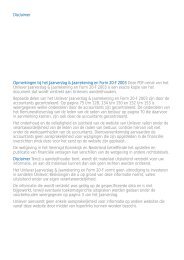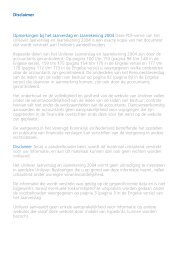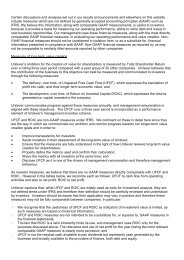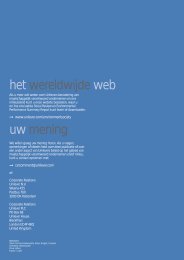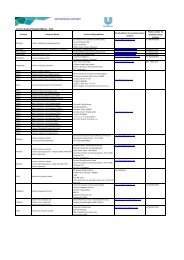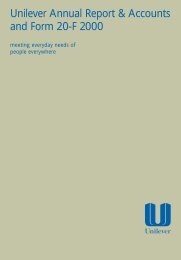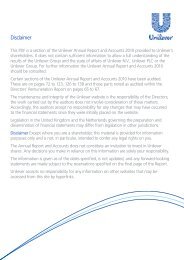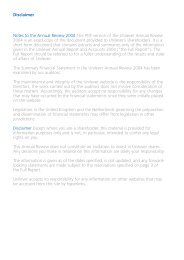Meeting everyday needs of people everywhere - Unilever
Meeting everyday needs of people everywhere - Unilever
Meeting everyday needs of people everywhere - Unilever
You also want an ePaper? Increase the reach of your titles
YUMPU automatically turns print PDFs into web optimized ePapers that Google loves.
<strong>Unilever</strong> Group Notes to the consolidated accounts<br />
28 Analysis <strong>of</strong> net funds/(debt)<br />
00000000000000001111<br />
Fl. million<br />
100000000000511<br />
Acquisitions/<br />
Disposals Other<br />
1 January Cash (excl. cash & non cash Currency 31 December<br />
1999 Flow overdrafts) changes movements 1999<br />
0000001111 05111 05111 05111 05111 05111<br />
Cash on call and in hand 2 047 786 199 3 032<br />
Overdrafts (2 404) 74 (57) (2 387)<br />
51115111<br />
860<br />
Borrowings due within one year (2 719) 442 (44) (1 492) (269) (4 082)<br />
Borrowings due after one year (5 023) (110) (9) 1 158 (100) (4 084)<br />
51115111<br />
332<br />
Current investments 10 870 (7 875) 6 (131) 384 3 254<br />
Cash on deposit 9 964 (4 634) — — 445 5 775<br />
51115111<br />
(12 509)<br />
05111 05111 05111 05111 05111 05111<br />
Net funds/(debt) 12 735 (11 317) (47) (465) 602 1 508<br />
05111 05111 05111 05111 05111 05111<br />
Other non cash changes include pr<strong>of</strong>its and losses on disposal and adjustments to realisable value <strong>of</strong> current investments; exchange<br />
gains and losses on borrowings; and the reclassification <strong>of</strong> long-term borrowings falling due within one year at the balance sheet date.<br />
00000000000000001111<br />
29 Financial instruments<br />
00000000000000001111<br />
The Group has comprehensive policies in place, approved by the directors, covering the use <strong>of</strong> straightforward derivative financial<br />
instruments. These instruments are used only for hedging purposes. Established controls are in place covering all financial instruments<br />
and include policies, guidelines, exposure limits, a system <strong>of</strong> authorities and independent reporting. Performance is closely monitored<br />
with independent reviews undertaken by internal audit. The accounting policies governing these instruments are in line with generally<br />
accepted practice and follow hedge accounting principles described in the accounting policies on page 64. The use <strong>of</strong> leveraged<br />
instruments is not permitted. Details <strong>of</strong> the instruments used for interest rate and foreign exchange exposure management, together<br />
with information on related exposures, are given below.<br />
Except for the description <strong>of</strong> <strong>Unilever</strong>’s currency exposures, all debtors and trade and other creditors have been excluded from the<br />
analysis below and from the interest rate and currency pr<strong>of</strong>iles in notes 14 and 15 on pages 76 and 77 either due to the exclusion <strong>of</strong><br />
short-term items, as permitted by United Kingdom Financial Reporting Standard 13, or because the amounts are not material.<br />
The reduction in the portion <strong>of</strong> fixed investments and fixed rate debt during 1999 and the position at the year end is in line with<br />
<strong>Unilever</strong>’s interest rate management policy. <strong>Unilever</strong> operates an interest rate management policy aimed at optimising net interest and<br />
reducing volatility. In general, cash is invested short-term, at floating interest rates. The interest payable on debt is in general also<br />
floating, but depending on the Group’s financial position, part may be fixed up to five years. This is achieved by using fixed rate longterm<br />
debt issues and derivative financial instruments such as interest rate swaps and forward rate agreements.<br />
At the end <strong>of</strong> 1999 interest rates were fixed on approximately 22% <strong>of</strong> the projected debt for 2000 and 21% for 2001 (compared to<br />
72% for 1999 and 50% for 2000 at the end <strong>of</strong> 1998). Interest receivable was fixed on approximately 34% <strong>of</strong> projected funds for<br />
2000 and 15% for 2001 (compared to 31% for 1999 and 16% for 2000 at the end <strong>of</strong> 1998).<br />
Nominal values <strong>of</strong> interest rate derivative instruments are shown in the table below. These nominal values when compared to the<br />
nominal value <strong>of</strong> the underlying debt and investments do not reflect the actual level <strong>of</strong> use <strong>of</strong> financial instruments. This is because<br />
certain financial instruments have consecutive strike and maturity dates on the same underlying investments in different periods.<br />
Derivatives are primarily used to swap fixed interest long-term debt into floating rate debt or to swap floating rate investments into<br />
fixed rate investments. Whilst the nominal amounts reflect the volume <strong>of</strong> activity, they do not therefore properly reflect the amount <strong>of</strong><br />
credit risk to which the Group is exposed. The market value <strong>of</strong> these interest rate instruments at the end <strong>of</strong> 1999 represented an<br />
unrealised and unrecognised loss <strong>of</strong> Fl. 60 million (1998: gain <strong>of</strong> Fl. 243 million). In 1998 losses <strong>of</strong> Fl. 47 million were deferred on the<br />
balance sheet. 44% (1998: 50%) <strong>of</strong> these derivative financial instruments will mature within one year, 92% (1998: 93%) within five<br />
years and the balance within ten years.<br />
00000000000000001111<br />
Fl. million<br />
0100511<br />
Nominal amounts at 31 December<br />
051111105111<br />
1999 1998<br />
00000011111105111110511105111111105111 05111<br />
Interest rate swaps 8 278 11 280<br />
Forward rate agreements 2 641 —<br />
05111 11051<br />
Total 10 919 11 280<br />
00000000000000001111



